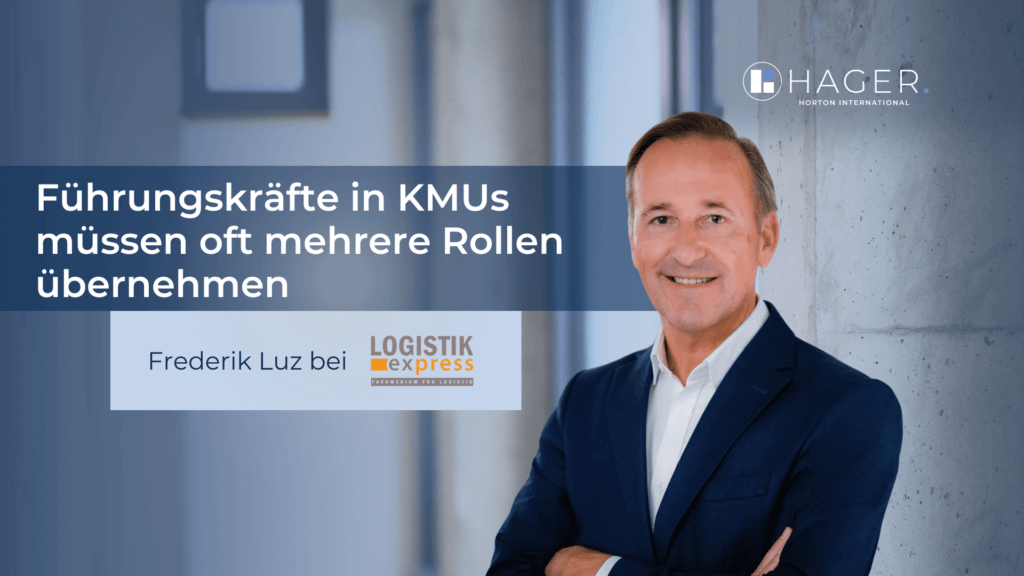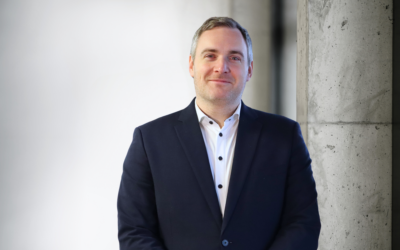
First-class managers are important so that small and medium-sized companies can compete against the major powers in the logistics market. But the competition for personnel with the big players is tough. In addition, medium-sized companies in particular need a special type of manager, explains Frederik Luz, Business Unit Manager Logistics at HAGER Executive Consulting, in an interview: a mix of strategists with vision, a lot of data know-how, but also a hands-on mentality, high resilience and a good dose of empathy, enthusiasm, willingness to learn and desire to shape things.
The German logistics industry is at a crossroads where large companies are increasingly displacing smaller players, while SMEs are suffering from financial bottlenecks.
Interview
What challenges do you currently see in recruiting leaders who can help SMEs remain competitive in this environment?
A key challenge for SMEs in the logistics industry is finding the right leaders. Such leaders must not only have a deep understanding of industry-specific requirements, but also combine cross-functional skills: They should understand technological innovations such as automation and data analysis, but at the same time promote economic thinking and sustainable strategies.
However, competition for talent is fierce. While large companies lure in employees with attractive salary packages, extensive benefits and clear career paths, SMEs often have limited resources to offer. For smaller companies, this means they need to focus on highlighting the advantages they can offer, such as flat hierarchies, direct decision-making processes and the opportunity to make a real difference.
In addition, managers in SMEs often have to take on several roles. They are not only involved in strategic work, but also in operations and are required to manage creatively with tight budgets. This requires a special kind of manager who is prepared to be flexible and hands-on in this dynamic environment.
Automation and digitization are key drivers of logistics transformation, but many SMEs lack the necessary resources. What qualifications should managers and specialists have in order to drive these technological changes even with limited resources?
The logistics industry is facing fundamental change, and leaders play a key role in successfully integrating technological innovations. They should not only bring technical skills, but above all strategic and innovative thinking. A manager who is to drive technological change must understand how digital solutions – from automation to AI-supported data analysis – can be integrated into the existing infrastructure.
In addition, the ability to draw the right conclusions from data is a crucial success factor. But technology alone is not enough. Managers must be able to inspire their team to embrace change and lead them through possible uncertainties. Change management and clear communication are therefore at least as important as technical know-how.
In addition, a willingness to learn is essential: anyone who is not constantly prepared to embrace new developments will quickly fall behind the competition. Personal characteristics such as resilience, pragmatism and the ability to make calm and considered decisions even under pressure round off the requirements profile.
In addition, innovation and agility are crucial to keep up with the times in a rapidly evolving industry.
How do you recognize personalities who are able to lead a company innovatively and flexibly through transformative processes?
The ability to lead a company in an innovative and agile way is an art that only a few leaders truly master. Such personalities are characterized by visionary thinking – they not only have a clear idea of where the company should develop, but also the ability to inspire others with this vision.
But vision alone is not enough. It requires a willingness to critically question the status quo and to make bold decisions. This includes not only encouraging innovation, but also taking risks and using mistakes as learning opportunities. Managers who create an agile environment not only give their team the freedom to be creative, but also actively support them in overcoming obstacles.
Emotional intelligence also plays an important role: empathy, understanding and building trust within the team are essential to stick together in turbulent times. This mix of strategic vision and interpersonal skills makes leaders real drivers of change and progress.
At the same time, resilience is an indispensable factor for the logistics industry in times of global uncertainty. What characterizes leaders who not only master short-term challenges but also build a resilient organization in the long term?
Recent years have shown how vulnerable global supply chains are to sudden disruptions – be it due to pandemics, geopolitical conflicts or natural disasters. Logistics leaders are therefore faced with the challenge of not only responding to current crises, but also making their companies resilient in the long term.
Resilience means much more than just crisis management. It is about planning ahead, identifying potential risks early on and developing strategies that make the company robust. Technological competence is an important building block here: digital tools and data-based decisions help to make processes more efficient and flexible.
At the same time, sustainable aspects must not be ignored. Companies that integrate ecological and social responsibility into their strategies not only create a competitive advantage, but also build trust among customers and partners. Successful leaders combine these skills with a clear vision and the ability to inspire their team to follow the same path.
Sustainability is not only an environmental challenge, but also a strategic one that increasingly influences the success of a company. What kind of leaders are needed to effectively implement sustainable practices while achieving economic goals?
Sustainability is no longer a “nice-to-have” but a key success factor in the logistics industry. Managers who really want to make a difference in this area must not only have economic goals in mind, but also show a willingness to take new paths.
Innovative solutions such as low-emission means of transport or energy-efficient storage technologies require not only technical knowledge, but also the ability to integrate these innovations in a cost-effective manner. It is important to win over employees and partners alike to these ideas and to work together towards a more sustainable future.
But sustainability also requires long-term thinking. It is not enough to achieve short-term successes – a real transformation requires patience, perseverance and the willingness to constantly check whether the chosen course is still the right one. Leaders who embody these values can not only strengthen their own company, but also advance the entire industry.
Ultimately, creating a balance between the major players and SMEs in the logistics industry requires a broad perspective. How should leaders be positioned to promote a balance that supports diversity and innovation in the industry?
The logistics industry is increasingly dominated by large players such as Kühne+Nagel and DHL. But to maintain a healthy competitive landscape, SMEs must also have a chance to grow and innovate. Leaders who want to promote this balance need a keen sense of the needs of both sides.
They should not only drive technological progress, but also create opportunities for smaller companies to benefit from the resources and know-how of the larger ones. This includes promoting cooperation based on mutual respect and benefit.
Strong communication skills are essential here: Only those who bring everyone involved to the table and enable open dialogue can really build bridges. With strategic vision and an inclusive mindset, leaders can create an environment in which companies of all sizes can successfully coexist and benefit from one another.
Vita Frederik Luz
Frederik Luz can look back on prestigious career stages at leading global logistics service providers and digital innovation drivers in the logistics industry. As managing director, he has built up numerous logistics locations internationally. In his view, his success was always closely linked to his good instinct for selecting the right specialists and managers, who managed the challenges excellently with him.
Most recently, he was Managing Director of Express Air Systems GmbH, one of the leading providers of express air freight and a joint venture between DB Schenker and Kühne & Nagel.
Source reference: The original work can be found here https://www.logistik-express.com/fuehrungskraefte-in-kmus-muessen-oft-mehrere-rollen-uebernehmen/



